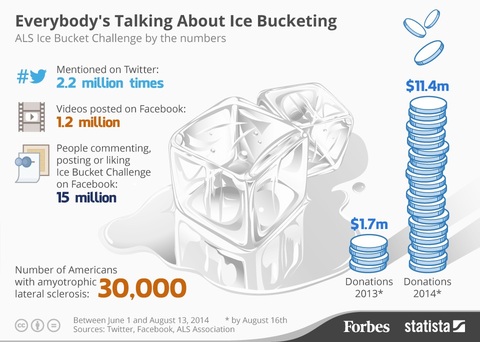|
Over the last few weeks we’ve seen videos of people screaming while getting soaked in the ice bucket challenge. From celebrities showering themselves in ice, to friends, family and strangers joining the trend.
People wanted to get their own version out there, nominating each other and spreading the word and raising funds for charities. it’s been a challenge that social media users couldn’t get enough of. As this stunt proved to be popular with all age groups, demographics around the world, it managed to raise awareness about Amyotrophic Lateral Sclerosis (ALS), a progressive disease of the nervous system, and significant donations flowed from far and wide. But how effective are such fads, from a longterm perspective? Making new behaviour ‘stick’ takes effort that allows the change to become part of the everyday norm, and sometimes, gimmicks like the ice bucket challenge can act as a catalyst for behaviour change, however showering in ice alone may not deliver the needs of charities for the longterm, while others argue that such campaigns may do more harm than good. The Giuardian ran an interesting article on the subject, you can click here to read more about it. Or for an interesting insight from an economist’s point of view, you can click here to see what they make of the challenge. In any case, it is vital to ensure that a viral campaign raises awareness about the disease, while also going beyond the one off donation into an ongoing commitment that converts this highly successful viral campaign into one that engenders positive, long-term behavioural change. Finally, I am pleased to share with you some great tips and ideas from Forbes on how other charities could benefit, a personal favourite is the ‘no-selfie challenge', click here to read the article.
2 Comments
The efforts around developing and integrating sustainability practices in an organisation clearly demonstrate how important effective change management and learning is in successful organisations. If an organisation’s rate of learning isn’t greater than its rate of change, then its going to fall behind the competition.
Employees in organisations, particularly customer service led organisations, are constantly solving problems, often under stress and with very tight deadlines. But how employees learn and adapt to the new norms, in an ever changing world, plays a critical role in how successful their organisation is, and how quickly it responds to changes in the fiercely competitive markets where they operate. When reviewing various organisations’ leaders, we can assess fairly quickly how quick these companies are at adopting change, such as the integration of sustainability, and the learning curve associated with that. Managers in those organisations tend to help their teams by ensuring that they work within a supportive learning environment, this can mean that employees feel confident to ask questions, admit mistakes, and freely share creative ideas that can help business become more efficient and effective while integrating sustainability. Those skills in the leadership of an organisation mean that employees are aware of their role, accountabilities and feel empowered to take decisions, whilst being comfortable with the very real risks that are present in the workplace today. This means that they can engage in the learning processes and adapt and implement change more swiftly. It goes without saying that to take this form organisations need to be supported by concrete processes and procedures that are widely communicated and understood by the workforce, the key point is how people are engaged. Employees in an organisation, and people generally, feel compelled to change what they do, not because they are given an order or an report that shifts their thinking, but really because they are shown a fact and the relevance and impact related to that fact which influences feelings, their thinking and their behaviour. In providing employees with this awareness, change management influences their commitment and encourages a higher level of engagement. Sustainability to Action can help you socialise your sustainability policies and strategies, please contact us for more information. |
Categories
All
AuthorSandra Anani is passionate about sustainability, with over 19 years’ experience. She has dedicated her career to sustainable development and communications. Archives
November 2022
|



 RSS Feed
RSS Feed
